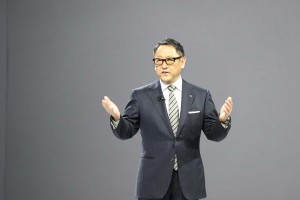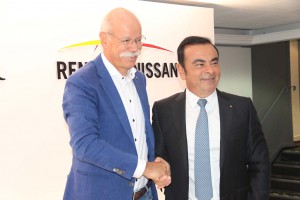
Toyota CEO Akio Toyoda expressed the need for automakers to form partnerships to keep up with advancing technology.
In a further sign of the seismic shifts reshaping the global auto industry, Japanese giant Toyota Motor Corp. has begun exploring a possible partnership with one of the country’s smaller carmakers, Suzuki Motor Corp.
Though only in an early, exploratory stage, such an alliance would focus, at least initially, on key trends such as autonomous and connected vehicles, as well as new mobility services. Toyota has been ramping up its efforts in self-driving technology after a slow start. But little Suzuki has not yet made any major moves to develop a technology that could become commonplace in the coming decade or two.
“The future looks perilous,” said Suzuki Chairman Osamu Suzuki, in a joint news conference with Toyota President Akio Toyoda. “R&D,” he stressed, “is changing rapidly.” Industry analysts warn that those manufacturers who don’t keep up could fail or find themselves targets for takeover.
In an industry where manufacturers typically compete fiercely, things are changing in response to pressure to develop autonomous and connected car technologies, set up mobility strategies and bring zero-emissions powertrains to market.
“The technology race in the auto industry has been escalating at a pace we’ve never seen before,” Toyota President Toyoda said during the news conference. “In a situation like this, there are limits to what any one company can do on their own … partnerships are becoming increasingly important.”
(Toyota recalling Prius hybrid to fix deadly defect. Click Herefor the story.)

Daimler AG CEO Dieter Zetsche, left, and Renault-Nissan CEO Carlos Ghosn agree that new opportunities are coming.
Toyota already has formed a tech partnership with Germany’s BMW AG to develop hydrogen fuel-cell systems. Some examples of what they’re working on will be seen during the 2020 Tokyo Olympics, BMW CEO Harald Krueger said this week.
Rival Japanese automaker Nissan, for example, has had a long-standing alliance with French maker Renault but is rapidly expanding ties to Germany’s Daimler AG, as well. That includes working on battery-electric technologies, while Renault-Nissan CEO Carlos Ghosn and Daimler Chief Executive Dieter Zetsche last month told TheDetroitBureau.com they are considering possible autonomous vehicle projects.
The changes sweeping the auto industry are proving especially challenging for small automakers that are already struggling to match the economies of scale of their bigger rivals.
That was one reason that Daihatsu, a Japanese carmaker focused on microcars, originally formed a partnership with Toyota. Toyota recently completed a total buyout of Daihatsu – which happens to be one of Suzuki’s key rivals in the Japanese “kei car,” or microcar, segment.
(Click Here for details about Renault-Nissan passing Toyota in global sales.)
Whether that rivalry can be overcome remains to be seen, and some potential legal challenges might be raised, depending upon the degree to which Toyota and Suzuki might eventually come together.
Suzuki is Japan’s fourth-largest automaker, but it focuses on a relatively narrow niche of products. It attempted to push into larger vehicles for the U.S., but after the failure of its midsize Kizashi model, it announced it was leaving the U.S. in 2012.
It remains a powerhouse, however, in some emerging markets, notably India, where it is the majority partner in Maruti Suzuki India, the country’s leading automaker.
After long steering clear of alliances, Toyota has been adding a list of new partnerships. Along with fuel cells, Toyota has been working on a sports car project with BMW. It has an engineering alliance with Mazda, as well.
Suzuki has been opening its own doors, albeit slightly. A nascent partnership with Volkswagen AG fell apart after an angry, public spat last year.
But facing the reality of a high-tech future that could overwhelm the company’s budget, Suzuki’s chairman approached Toyota about a possible deal. Osamu Suzuki, at 86, is the world’s longest-serving senior automotive executive. He was, however, caught up in a scandal earlier this year when it was revealed his company had cheated on mileage testing.
(To see more about Toyota’s commitment to cars, Click Here.)
A similar scandal embroiled Japanese rival Mitsubishi Motors Corp., forcing that embattled automaker to sell a controlling stake to long-time ally Nissan.
